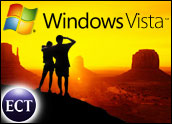
Growing concerns over migrating to Vista may push companies to adopt alternative operating systems. A study released in late November revealed that 90 percent of the Windows users polled reported concerns about migrating to Microsoft’s newest operating system.
Forty-four percent of those polled said they would consider deployment of alternative operating systems, such as Apple’s OS X and Linux, in order to avoid migrating to Vista.
The research, consisting of an online survey with 961 respondents, was commissioned by systems appliance management firm Kace to gather data about its customers’ perceived impact of Vista on IT departments and their operating system adoption strategies. The research shows that IT departments of all sizes have grave concerns about deploying Vista, and some are even choosing to deploy alternative operating systems instead, according to Kace.
“I was not as concerned with the Vista migration numbers as I was with the number of people reacting to the concerns over Vista. Those numbers surprised me. Two real concerns expressed by the respondents were the overall stability of Vista and the interoperatibility issue. People are scared that stuff won’t run,” Diane Hagglund, a partner at King Research, told TechNewsWorld.
Key Findings
While 90 percent of the participants reported concerns about migrating to Microsoft’s Windows Vista, 53 percent said they do not plan to deploy Vista at all. Another 13 percent said they expect to eventually be fully deployed on Vista.
Of those respondents who do not consider Windows Vista a viable option, 44 percent said their companies are considering deploying non-Windows operating systems as an alternative to upgrading to Vista. The most likely choice, they said, was OS X.
“Microsoft, up to this point, has been fighting an uphill battle with Vista largely due to software compatibility and stability issues, which are scaring off IT departments from deploying it,” said Hagglund. “These same IT departments are evaluating alternative methods in order to stave off Vista deployment but instead are facing new challenges related to managing heterogeneous environments.”
Slow Impact
The actual installed base of Vista users is reflected in the overall deployment of operating systems managed by Kace systems management hardware.
Kace appliances are connected to 200,000 endpoint computers. Of those computer systems that Kace manages, Vista is used by 0.53 percent of all connected machines, according to Rob Meinhart, CEO and co-founder of Kace.
Just over 95 percent of the machines run some other version of Windows. OS X accounts for 2.5 percent, while Linux/Unix is 1.6 percent. These results cover desktops and servers.
“This is causing people to take a closer look,” Meinhart told TechNewsWorld.
Concern over migrating to Vista could delay a more widespread adoption. At the very least, the concerns may delay enterprises from finalizing the decision to migrate to the new Windows OS.
“Vista, rather than advancing Microsoft’s lock, may have loosened it. The reaction to Vista is now encouraging people to look at alternatives. With any new technology, the first wave is unsettling. But this may signal more significant rumblings down the road,” said Hagglund.
Data Center Debate
Some experts, however, do not agree with the suitability of Vista over Linux or OS X. How quickly a company acts on concerns about a Vista migration could hinge on the specific industry involved.
For instance, Meinhart sees an increasing amount of Linux in data centers. Historically, the monopoly is for Windows, he said. He also sees a rapid movement to the Mac in that space, noting that his own company, Kace, is 40 percent non-Windows.
OS X is not even an issue in data centers, according to Anil Uberoi, chief marketing officer for Levanta, a Linux systems management vendor.
In addition, “We rarely see any interest in Vista over other platforms,” Uberoi told TechNewsWorld.
Migration Path
About 80 percent of the migrations from Windows is a move of DNS (domain name system) server or TCP/IP (transmission control protocol/Internet protocol) server to Linux for cheaper costs. Most of the migration involves migrating from Solaris or HP to Linux, he said.
“It is very common to see a Unix to Linux migration. Very rarely do we see people migrating major applications from Windows to Linux,” said Uberoi.
Companies may find that switching to Linux over Vista in data centers will bring higher systems management costs. Some industry accounts place that expense as growing four times the cost of hardware.
Factoring Issues
Cost is the primary driver in enterprise migration. Linux may have the advantage as a dedicated OS, noted Meinhart.
“There is no light version of Windows. Linux doesn’t work that way. That’s why more modern data centers use Linux. Windows is not really an issue in the migration question,” said Uberoi.
Another factor is the support issue. Windows and Linux managers rarely cross over in data centers. Unix and Linux support is similar. Windows support is a different skill set. So support is not easily leveraged to Windows. There is also a cultural bias to Linux, explained Uberoi.
Virtual OS
Some experts see virtualization as the ultimate migration draw. The Kace study revealed that 67 percent of respondents reported virtualized environments help in enabling the implementation to alternative operating systems.
The VMware environment is becoming more favorable. It makes the OS more like a window on a computer screen, with each window a different OS, said to Meinhart.
“Just as the Windows OS opened multiple window use on one computer, now VMWare allows users to run the best-of-breed programs in their own environments in an optimized state,” Meinhart said.
As a result, he is starting to see the skirmishes of an OS war.
“We are seeing inroads by Mac and Linux. This could take 10 years, but maybe the tipping point is starting now,” he suggested.





















































